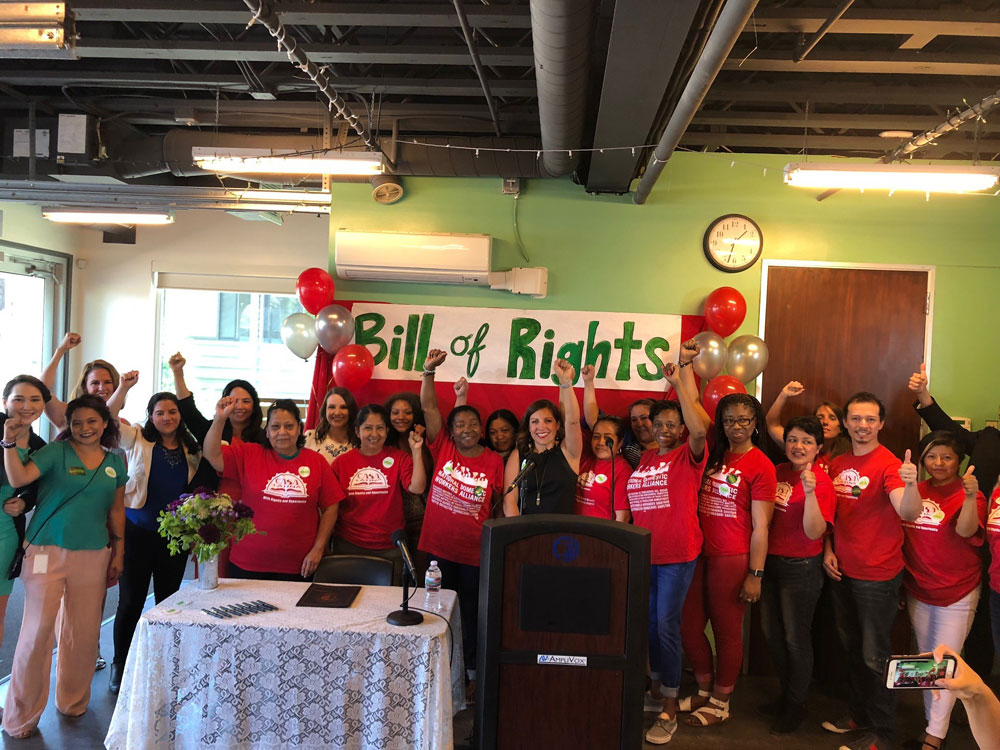
November 7, 2019; Next City
Domestic workers—the women (mostly) who clean other people’s homes, care for their young children, and assist growing numbers of elders—were left out of our national labor protection laws, passed in the 1930s, in a compromise with Southern legislators who were opposed to providing any rights to once-enslaved African Americans. That legacy remains, and thus, it has taken a growing movement of domestic workers, led by the National Domestic Workers Alliance (NDWA), to fight city by city and state by state for the kind of worker protections most laborers take for granted. Philadelphia is the latest city to pass a Domestic Workers Bill of Rights.
The Pennsylvania Domestic Worker Alliance (PDWA) formed just over a year ago in August 2018, as a joint project of NDWA and Philadelphia Jobs with Justice. They began work in earnest on the bill, executive director Nicole Kligerman told Next City, in November 2018. A year later, they are celebrating victory with the most expansive protections yet for domestic workers having passed the city council.
The Philadelphia law, which is expected to be signed by Mayor Jim Kenney and to go into effect in May 2020, “guarantees rest and meal breaks, paid time off, civil rights protections and written contracts.” If an employer doesn’t enter into a written contract, a “template contract,” still to be developed, will apply. Many of these protections are included in similar legislation passed in nine states—Connecticut, California, Illinois, Hawaii, Massachusetts, New York, New Mexico, Nevada, and Oregon—and the city of Seattle. But Philadelphia has gone further in two respects: The new law codifies civil rights protections—ending legal discrimination in whereby a private employer could refuse employment for any reason, including race—and establishes a system of portable benefits that will allow domestic workers to earn up to five days of paid leave annually.
These landmark provisions, says Kligerman, are the result of establishing a fully inclusive process to develop the legislation.
“In our negotiations we had domestic workers at the literal table in City Hall every week for months talking through it,” Kligerman said. “It was really critical to make sure the lived experience of workers, and the knowledge and expertise that they bring, were centralized within the process.”
Philadelphia has 16,000 domestic workers who provide services in private homes. On average, these workers—mostly women of color, many of them immigrants—earn about $10,000 per year, according to a 2016 study. These workers, because of the informal nature of their employment, are often abused and exploited, particularly if they are undocumented. The new city ordinance takes work that is done in the shadows and professionalizes it, helping to reduce risks.
Sign up for our free newsletters
Subscribe to NPQ's newsletters to have our top stories delivered directly to your inbox.
By signing up, you agree to our privacy policy and terms of use, and to receive messages from NPQ and our partners.
Under the new law, any employer who hires a domestic worker for at least five hours a month will be required to sign a written contract. If they don’t do so, the template contract will be presumed to govern the relationship. Massachusetts has a similar policy, but the minimum work threshold is 16 hours per week for a single employer. As a result, many domestic workers are left out—house cleaners for example, may work just a few hours per month for as many as 20 different employers.
“The written agreement provision is really what professionalizes the work and provides job security,” says Kligerman. “That’s the piece of it that says ‘this is what you are expected to do, this is when you’re expected to be here, this is when you expect to get paid, how you get paid, when you get severance and notice of termination.’”
The system of portable benefits is also unique to Philadelphia. Portable benefits are a concept gaining momentum among advocates for low-wage and gig-economy workers, who don’t have standard employment contracts with employer-sponsored benefits. In the case of Philadelphia’s domestic workers, employers will be required to contribute a prorated amount, depending on how many hours they employ the worker, to a benefit fund. Workers would earn one hour of time off for every 40 hours of work (no matter how many employers are involved), the same ratio as is required under the city’s paid sick leave bill, which applies to businesses employing 10 or more employees.
The portable benefits system will take some time to implement. The new law calls for the procurement of a technology platform to track the accumulation of hours across multiple employers. NDWA has recently built and launched an app that does just this, but the city will have an open bid process before making a decision.
Implementation of domestic worker protections is tougher than passing legislation, and Kligerman recognizes that it will take time to build a culture of enforcement. Philadelphia has passed several new laws to protect low-wage workers, including a $15 minimum wage that goes into effect in January 2020. Philadelphia District Attorney Larry Krasner has created a new unit within his office to enforce worker protections, a positive step toward ensuring domestic workers and others are treated with respect and dignity.
Says Kligerman, “Do I anticipate 16,000 people getting five days paid time off in 2020? No, but this law is a jumping off point to continue to build power and improve material conditions of domestic workers and all different kinds of gig workers in an increasingly gig-ified labor market.”—Karen Kahn













